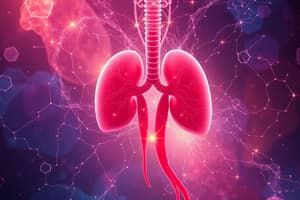Podcast
Questions and Answers
What is the primary cause of primary adrenal insufficiency?
What is the primary cause of primary adrenal insufficiency?
Which condition is characterized by low ACTH levels while usually sparing aldosterone production?
Which condition is characterized by low ACTH levels while usually sparing aldosterone production?
Cushing Disease specifically refers to what underlying cause of high cortisol levels?
Cushing Disease specifically refers to what underlying cause of high cortisol levels?
What is the most common cause of primary hyperaldosteronism (Conn’s Syndrome)?
What is the most common cause of primary hyperaldosteronism (Conn’s Syndrome)?
Signup and view all the answers
In congenital adrenal hyperplasia (CAH), what is the most common deficiency affecting cortisol production?
In congenital adrenal hyperplasia (CAH), what is the most common deficiency affecting cortisol production?
Signup and view all the answers
Study Notes
Primary Adrenal Insufficiency
- Autoimmune destruction of the adrenal glands is the most common cause.
- Leads to loss of cortisol and aldosterone production.
- Other causes include infections or adrenal hemorrhage.
Secondary Adrenal Insufficiency
- Caused by pituitary dysfunction.
- Pituitary tumors or other conditions impacting the pituitary gland can cause this.
- Results in low ACTH, leading to decreased cortisol production.
- Aldosterone production is usually spared.
Cushing Syndrome
- Most commonly caused by exogenous corticosteroid use.
- Adrenal tumors producing excess cortisol are another cause.
- Both cause high cortisol and suppression of ACTH.
Cushing Disease
- Refers specifically to a pituitary tumor that secretes excess ACTH.
- This overstimulates the adrenal glands and leads to high cortisol levels.
Primary Hyperaldosteronism (Conn's Syndrome)
- Usually due to bilateral adrenal hyperplasia (BAH) or aldosterone-producing adenomas (APA).
- Both result in excessive aldosterone production.
- This leads to sodium retention and potassium loss.
Secondary Hyperaldosteronism
- Caused by conditions that stimulate the adrenal zona glomerulosa via the renin-angiotensin-aldosterone system (RAAS).
- Common causes include renal artery stenosis and congestive heart failure.
- These conditions increase renin, subsequently increasing aldosterone.
Congenital Adrenal Hyperplasia (CAH)
- A genetic disorder, most commonly due to 21-hydroxylase deficiency.
- Impairs cortisol production.
- Lack of negative feedback leads to increased ACTH, adrenal hyperplasia, and excess androgen production.
- Depending on enzyme deficiency, CAH can cause salt-wasting (low sodium, high potassium) or increased androgen effects like virilization.
Studying That Suits You
Use AI to generate personalized quizzes and flashcards to suit your learning preferences.
Description
Test your knowledge on various adrenal gland disorders, including primary adrenal insufficiency, secondary adrenal insufficiency, Cushing syndrome, and hyperaldosteronism. Understand the causes, effects, and key differences among these conditions.




